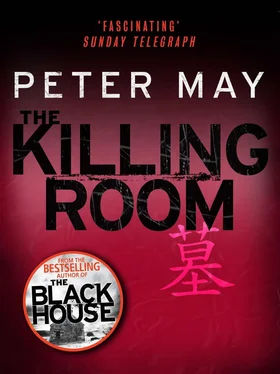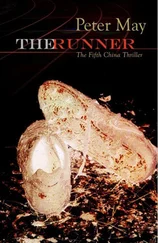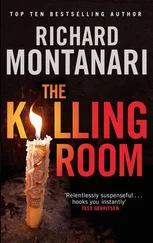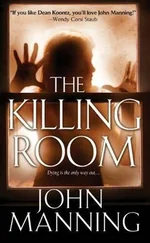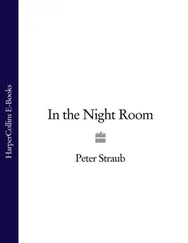Peter May - The Killing Room
Здесь есть возможность читать онлайн «Peter May - The Killing Room» весь текст электронной книги совершенно бесплатно (целиком полную версию без сокращений). В некоторых случаях можно слушать аудио, скачать через торрент в формате fb2 и присутствует краткое содержание. Год выпуска: 2012, Издательство: Quercus, Жанр: Триллер, на английском языке. Описание произведения, (предисловие) а так же отзывы посетителей доступны на портале библиотеки ЛибКат.
- Название:The Killing Room
- Автор:
- Издательство:Quercus
- Жанр:
- Год:2012
- ISBN:нет данных
- Рейтинг книги:5 / 5. Голосов: 1
-
Избранное:Добавить в избранное
- Отзывы:
-
Ваша оценка:
- 100
- 1
- 2
- 3
- 4
- 5
The Killing Room: краткое содержание, описание и аннотация
Предлагаем к чтению аннотацию, описание, краткое содержание или предисловие (зависит от того, что написал сам автор книги «The Killing Room»). Если вы не нашли необходимую информацию о книге — напишите в комментариях, мы постараемся отыскать её.
The Killing Room — читать онлайн бесплатно полную книгу (весь текст) целиком
Ниже представлен текст книги, разбитый по страницам. Система сохранения места последней прочитанной страницы, позволяет с удобством читать онлайн бесплатно книгу «The Killing Room», без необходимости каждый раз заново искать на чём Вы остановились. Поставьте закладку, и сможете в любой момент перейти на страницу, на которой закончили чтение.
Интервал:
Закладка:
Peter May
The Killing Room
PROLOGUE
The rain, like tears, streaks his view of the world from the back seat of his limousine. A blue-grey view smudged by this chilly sub-tropical November deluge. The American has come to celebrate a union spanning continents, a powerful conjoining of East and West. But all the money in the world cannot protect him from the horrors that are only minutes away.
Towers of steel and glass rise into the mist around him, insubstantial and wraith-like. They remind him of something strangely incongruous. A remote and rugged coastline on the north-west extremes of Europe. A trip made in search of his roots to a distant Scottish island, where fingers of stone reach for the sky in strange circular arrangements. Standing stones raised in worship to who knows what God.
Beyond the colossal pagoda-like Jin Mao Tower, its peak lost in cloud, more towers loom out of the misted distance, rising from the ashes of Mao’s dream of a communist utopia. The once desolate marshlands of Pudong, fed by their privileged status of ‘special economic zone’, now sprout tower blocks like weeds, watched in wonder by the Shanghainese across the river, a whole generation thinking, what next? The American looks up at these twenty-first century standing stones, and knows that the only God worshipped by those who raised them is Money. And he smiles. A sense of satisfaction in this. For he worships at the same altar.
They pass a high, sweeping wall painted salmon pink and topped by spiked black railings. His limo draws in behind others it has been following. Umbrellas, black and shiny, cluster immediately around his door. He steps out on to red carpet, and water pools around his feet as the weight of his steps squeezes rain from the pile.
Through open gates, the site unfolds before him, a forest of steel rods rising out of the concrete blocks already sunk there. On the far perimeter two tiers of workmen’s huts rise from the mud. Pale oriental faces gather in the rain to watch with dull curiosity as the party makes its perilous way across the quagmire, red carpet submerged now in liquid mud that sloshes over black shiny leather, spattering the bottoms of freshly pressed trousers. The American feels cold water seeping between his toes and curses inwardly. But his outward smile remains, fixed and determined for his Chinese hosts. They are, after all, partners in the biggest Sino-American joint venture yet attempted, although it is hard for him to believe that this sodden site will support the massive construction of steel and glass that will become the New York-Shanghai Bank, the tallest building in Asia. But he is reassured by the knowledge that his position as its chief executive officer will make him one of the most powerful men on earth.
He climbs the stairs to the stage, protected from the rains by its huge canvas awning, and steps into the glare of the world’s press, television lamps flooding this grey winter morning with a bright blue-white light, cameras flashing in the rain like fireflies. His PR people have done their job.
Strings of coloured bunting hang limp in the wet as his Chinese opposite number, smiling, approaches the microphone to begin the obligatory speeches. The American lets his mind and eyes wander. Above the temporary construction of the stage, a huge hopper leans over, its snout pointing downwards to the deep trench below. When he steps forward to release its lever, tons of concrete will pour from its mouth into the bowels of what will be his bank — a ceremonial foundation stone upon which he knows he will build a future of unparalleled success.
A sprinkling of applause, like water pouring from a jug, breaks into his thoughts. A hand on his elbow steers him towards the microphone. Fireflies flash. He hears his own voice, strange and metallic, through distant speakers, words he has learned by heart, and he cannot help but notice that the trench below him is rapidly filling with water, thick brown water like chocolate, boiling in the rain.
More applause, and he steps forward from the cover of the awning on to a small, square projecting platform, a Chinese at his right hand holding an umbrella above his head, beaded curtains of water tumbling around him. He takes the lever in his hand, and with a sense of absolute control of his own destiny, draws it down. All faces lift expectantly towards the hopper. For a moment, it seems, everyone is holding their breath. Only the tattoo of rain on canvas invades the sense of expectation.
The American feels something shift beneath his feet. There is a loud crack, then a strange groaning like the rattle of a dying man’s last breath. The struts supporting the boards of his tiny platform give way as the walls of the trench below collapse inwards. He turns, clutching in fear at the sleeve of the arm holding the umbrella, but already he is pitchingþ
forward through the curtain of rain. The sensation of falling through space seems to last an eternity. His own scream sounds disconnected and distant. And then the shock of cold liquid mud takes his breath away. The whole world appears to be falling in around him as his flailing arms endeavour to prevent him from being sucked under. He sees an arm reaching out towards him and thinks, thank God! He clutches the hand and feels its flesh oozing between his fingers. But he has no time to consider this. He pulls hard to try to haul himself from the mud, but the outstretched arm offers no resistance, and as he falls back again he realises that it is not attached to anything. He lets go immediately, repulsed and uncomprehending. He can hear voices shouting above him as he flips over in time to see a woman’s breasts emerging from a wall of mud, followed by her shoulders and belly. But no arms, no legs, no head. His own arms windmilling in panic, he kicks away again, only to find himself staring into a face with black holes where the eyes should be, long dark hair smeared across decaying flesh. He feels bile rising in his throat with his scream, and as he looks upward in a desperate appeal for help, he sees again the standing stones rising over him in the mist. Only now he sees them quite differently, clustered together like headstones in a cemetery.
CHAPTER ONE
I
The cold, dry earth rattled across the lid of the coffin as it left her mother’s hand. Margaret, too, stooped to lift a handful and felt the frosted dirt stick to her skin. She let it fall from her fingers into her father’s grave, and lifted her eyes to a pewtery sky. The first snow of winter fluttered on the edge of an icy wind that blew in across the distant lake and she shivered, pulling her coat tight around herself to contain her grief.
She turned away from the handful of mourners at the graveside, a few relatives and friends, a representative from the university, some old students of her father. There was something primitive about the ritual of burial that seemed somehow absurd to Margaret. Placing a person in a wooden box in the ground and leaving them to rot. She had seen enough bodies in various states of decomposition to have decided long ago that when her turn came she would be cremated. It was simpler, cleaner. More final, somehow. She knew the stages of decay that the body they had buried would undergo, and she did not want to think of her father like that.
The wind rattled the branches of the empty trees, stark in their winter nakedness. The last leaves of fall lay rotting on the ground, silver edged by the previous night’s frost. Somewhere, away to their left among the rows of tombstones, she knew, lay the graves of famous gangsters from the city’s colourful past. Alphonse Capone, and his father and mother; the infamous John May and his wife Hattie; ‘Machine Gun’ Jack McGurn; Antonio ‘The Scourge’ Lombardo; and dozens more Italian immigrants and their descendants who had helped sow the seeds of America’s organised crime in this windy place. Her father had kept better company in life.
Читать дальшеИнтервал:
Закладка:
Похожие книги на «The Killing Room»
Представляем Вашему вниманию похожие книги на «The Killing Room» списком для выбора. Мы отобрали схожую по названию и смыслу литературу в надежде предоставить читателям больше вариантов отыскать новые, интересные, ещё непрочитанные произведения.
Обсуждение, отзывы о книге «The Killing Room» и просто собственные мнения читателей. Оставьте ваши комментарии, напишите, что Вы думаете о произведении, его смысле или главных героях. Укажите что конкретно понравилось, а что нет, и почему Вы так считаете.
